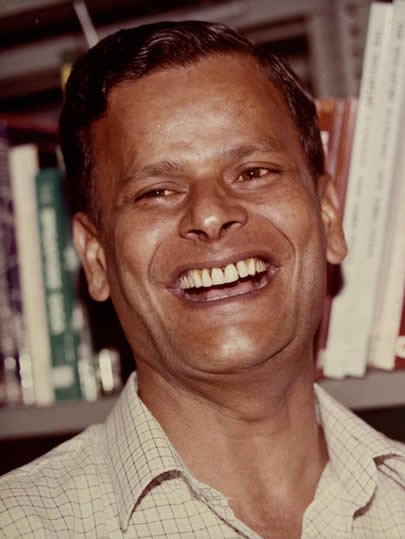

M. Balakrishnan

M. Balakrishnan (b. 18 September 1938, Singapore–), or Mayandiambalam Balakrishnan, is a prominent author popularly known by his pen name – Ma Ilangkannan. He was the first Tamil writer to receive the South East Asian Writers Award in 1982, and was awarded the Cultural Medallion in 2005.
Early life and career
Balakrishnan was born in Singapore and moved with his family to Tamil Nadu in India when he was two years old. In India, he learned to read and write Tamil from his grandmother and a teacher, Arumuga Velar.
After World War II, Balakrishnan returned to Singapore, and continued his studies at Kalaimagal Tamil School. His family often moved between rented accommodation and with these moves disrupting his schooling, Balakrishnan studied up to the eighth standard in school. From a young age, he was an avid reader of magazines such as Kalki, Ananta Vikatanand Tenral, and the Tamil Murasu newspaper. Although he was unable to further his education, Balakrishnan continued to acquire knowledge and hone his literary skills.
For a decade from 1957, Balakrishnan worked as a storeman with the British military forces stationed in Singapore. He then went on to become a typist in the translation department of the Ministry of Culture, where he worked until 1997.
Literary career
Balakrishnan became editor of Thondan, a literary magazine in 1964, and published his first short story Thi Vali (Pain of Fire) in 1966. His stories also appeared in Tamil Murasu, Tamil Malar, Ananda Vikatan (a weekly magazine from India), Malaysia’s Tamil Nesan and literary journals such as SINGA.
A prolific writer, Balakrishnan has published more than 60 short stories, five collections of short stories, three novels and three novellas. His short stories have been broadcast over radio, included in a number of anthologies, and translated into English and Malay.
Awards
In 1971, Balakrishnan won a short story competition organised by Indian magazine, Ananta Vikatan, for Vazhi Piranthathu. In 1977, his Ennangal Nilaiyaanavai Alla was selected as the Best Short Story in Singapore and Malaysia by the Singapore Ilakkiya Kalam (Literary Critics’ Circle). He received the South East Asian Writers Award in 1982, and won short story competitions organised by the Ministry of Culture in 1983 and 1984, the National Book Development Council of Singapore in 1988 and the Ministry of Community Development in 1989.
For his extensive body of literary work, the Association of Singapore Tamil Writers presented Balakrishnan with the Tamizhavel Award in 1999. He won the Singapore Literature Prize in the Tamil category in 2004 for Thoondil Meen (Hooked Fish), and received the Cultural Medallion the following year.
Literary style and themes
Balakrishnan’s works embody a Singaporean Tamil consciousness and explore the existence, pains and pleasures, conflicts and tensions of Singapore Tamils in a multi-ethnic and multi-cultural socio-political context. Exploring a range of social topics, his writings have often employed metaphor and imagery in a quest for truth and humanity in a materialistic world.
Balakrishnan has examined the evolution of the Tamil cultural identity after contact with Malay and Chinese cultures in cosmopolitan Singapore. His works also include keen observations of the Tamils’ experiences and daily life in Singapore. Other themes have included the experiences of impoverished underdogs in Singaporean society, cross-ethnic relationships, the Japanese Occupation and the Indian National Army. Historical and vanishing aspects of Singaporean life such as the cattlemen and cowherds of Bukit Timah and opium addicts have also appeared in his works.
Notably, Balakrishnan is one of the few Tamil writers in Singapore who have explored the existential toils and displacement of the disenfranchised with empathy. Beyond describing the experiences of characters such as Indian contract workers forced by circumstances to find work in Singapore (in Paathai Maaria Payanam (Misdirected Journey), he has sought to articulate their aspirations, emotions and mental states. His narratives gave voice to these otherwise unheard groups and have been described as a conduit for the emancipation of these groups.
Awards
1982: South East Asian Writers Award.
1999: Tamizhavel Award.
2004: Singapore Literature Prize.
2005: Cultural Medallion.
2013: Karikalan Award (Given by Mustafa Trust)
Selected work
1975: வழி பிறந்தது. – The solution
1976: அலைகள். Waves
1977: குங்குமக்கன்னத்தில். On the Rosy Cheeks
1977: சிங்கப்பூர் இலக்கியக்களம் சிறுகதைகள்.
1977: அலைகள் (சுருக்கம்). Waves (Summary)
1978: கோடுகள் ஓவியங்கள் ஆகின்றன. The Portraits
1983: உறவுகள் ஊஞ்சல் ஆடுகின்றன.
1986: ஆனந்தக் கண்ணீர். Tears of Joy
1989: எண்ணங்கள் நிலையானவை அல்ல
1990: வைகறைப் பூக்கள். Morning Flowers
1993: உணர்வின் முடிச்சுகள். The entangled feelings
1999: நினைவுகளின் கோலங்கள். Meandering thoughts
2001: தூண்டில் மீன்.
2001: இலட்சியங்களின் ஊனங்கள் (in People on the Bridge: An Anthology of ASEAN Short Stories; translated into Malay as Harapan Sapuna).20
2006: சிங்கை மா. இளங்கண்ணனின் சிறுகதைகள்.
2006: பொருத்தம், கன்னிகாதானம், எங்கே போய்விடும் காலம்?
2011: குருவிக் கோட்டம்.
Source: https://eresources.nlb.gov.sg/infopedia/articles/SIP_2012-09-03_100558.html